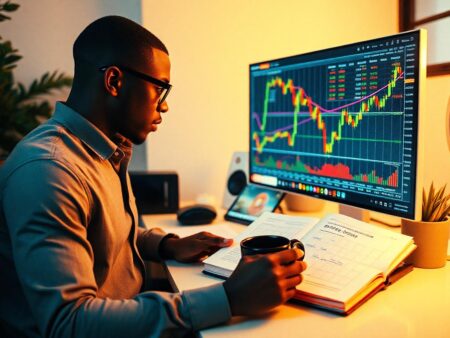Complete Guide on What is Deviation in Forex
If you’re new to trading and wondering, “What is deviation in Forex?” or what deviation in forex is — this article is for you. Learning about deviation early on in your trading journey will help you manage expectations and plan for unexpected market behavior. We recommend starting with a demo account to practice without risking real money. Demo accounts provide a risk-free environment to explore trading strategies while understanding deviation and market volatility.
Deviation in Forex refers to the difference between the expected price or the outcome of a trade and the actual result. It is a measure of how much the market deviates from its expected behavior. Deviation plays a very important role in understanding market volatility and upcoming price movements, making it an essential skill for traders to understand, especially beginners.
Helps manage trading risks
Informs better decision-making
Improves market predictions
Enhances risk management strategies
Offers insights into market volatility
Increased exposure to risk
Unexpected market losses
Difficulty in predicting market movements
Misjudging trade entries and exits
Higher chance of losing trades
In simpler terms, when you expect a currency pair to move a certain way based on analysis, but it moves differently, that’s deviation. For instance, if you’re trading EUR/USD and expect it to rise after a major economic announcement (which you can find using an economic calendar), but it falls instead, that unexpected move downwards is considered deviation.
Understanding deviation can help traders make more informed decisions & understand mistakes they have made in the past. Whether you’re analyzing past price movements or looking ahead, knowing how deviation works allows you to foresee potential risks in the market.
Why Is Deviation Important?
Forex markets are highly unpredictable, driven by multiple factors such as economic data releases, geopolitical events, and market sentiment. These factors often lead to deviations from expected price levels. While volatility creates opportunities for profit, it also carries multiple hidden risks. By understanding what deviation is in Forex, the deviation in forex can be applied by traders who can better manage those risks and make those unexpected surpriseses less frequent.

Types of Deviation in Forex
There are a few different types of deviation that traders should be aware of, especially for deviation in forex:
- Positive Deviation: This occurs when a price moves more favorably than expected. For example, if you’re long on GBP/USD and the pair rises more than predicted, that’s a positive deviation. While this is beneficial, it still requires careful risk management to lock in your profits.
- Negative Deviation: This happens when the price moves unfavorably compared to your predictions. For instance, if you’re expecting a currency pair to rise and it falls sharply instead, you’re experiencing negative deviation. This often results in a loss if risk management isn’t in place.
- Slippage: While slippage refers to the difference between the expected price and the actual price at which a trade is executed, it’s a form of deviation that happens during highly volatile market conditions. For example, if you’re placing a trade during a big economic news event, the price can change quickly, resulting in slippage.
- Standard Deviation: Standard deviation is a statistical measurement that helps quantify the volatility of an asset’s price. In Forex, standard deviation can indicate how much the price of a currency pair moves away from its average price. A higher standard deviation signals greater price fluctuation, while a lower one suggests more stability.
Why Deviation Matters for Beginners
As a beginner, it’s easy to assume that markets will move in a predictable manner and act like you understand the market, we have all been there, especially after conducting research and analysis. However, it is not that easy. Understanding what is deviation in Forex allows you to prepare for market movements that don’t align with your predictions. This knowledge enables you to develop a risk management plan, which is essential for long-term trading success.
When trading, no matter how good you think your analysis is, the market will sometimes move in unexpected directions (more often unfavorably). By recognizing that deviation is a part of trading, you can be mentally and financially prepared for sudden shifts in price. Additionally, tools like stop-loss and take-profit orders can help lower the risks related to deviation, allowing you to exit (or take profits, in the opposite case) from a trade before the market moves too far against your initial prediction.

How to Calculate Standard Deviation in Forex
Standard deviation is a widely used metric in Forex trading to understand volatility. We’ll take a look into how to calculate standard deviation in Forex .Here’s an example of how you can begin to calculate it:
- Determine the Mean: Calculate the average price of a currency pair over a specific period.
- Subtract the Mean from Each Price Point: Take each price in your dataset and subtract the mean from it. This will give you the deviation for each point.
- Square the Deviations: Square each of these deviations to remove negative values.
- Average the Squared Deviations: Add up all the squared deviations and divide by the number of price points to get the variance.
- Take the Square Root: Finally, take the square root of the variance to obtain the standard deviation.
In practice, most trading platforms have built-in tools to calculate standard deviation for you, but it’s useful to understand the fundamental concept and how it reflects volatility, it’s the same logic as when learning complex pure mathematics when there are already calculators that can do it for you in milliseconds.
Forex Factory and Deviation
If you’re looking to keep up with the latest economic events that can cause market deviations, Forex Factory is a fantastic tool. Their economic calendar lists upcoming events that can have a major impact on currency movements, helping you to anticipate potential deviations in the market.

Setting Up Demo Accounts
Using a demo account is a great way to get familiar with how deviation in forex works in real market conditions, and often necessary for beginner traders. Many brokers offer demo accounts, allowing traders to practice with virtual funds. For example, brokers like Pepperstone, XM, Exness, Plus500 and OANDA provide excellent demo accounts options, some even offering unlimited virtual funds, allowing beginners to test their strategies in a risk-free environment.
By starting with a demo account, you can see firsthand how deviation plays a role in your trades. This helps you develop strategies that can withstand unpredictable market moves. Once you’re comfortable with your understanding of deviation, you can switch to a live account.
FAQ: What Is Deviation in Forex?
What is deviation in Forex?
Deviation in Forex is the difference between the expected price movement and the actual result of a trade. It helps traders understand the volatility of the market.
How does deviation affect my trades?
Deviation affects your trades by showing how much the price can deviate from your expectations. This can lead to unexpected profits or losses depending on how the market moves.
Can deviation be avoided in Forex trading?
Deviation cannot be entirely avoided, but it can be managed using risk management strategies like stop-loss orders, take-profit orders, and trading during less volatile market conditions.
Is standard deviation the same as deviation in Forex?
Standard deviation is a specific statistical measure used to quantify price volatility in Forex. While related, standard deviation focuses on volatility over a period of time, whereas general deviation refers to the immediate difference between expected and actual price movements.
What tools can I use to track deviation?
Most trading platforms have tools like Bollinger Bands and indicators that use standard deviation to measure volatility. You can also follow economic calendars like Forex Factory to track events that could cause deviations.
Summary: Mastering Deviation in Forex
Understanding what deviation in Forex is can significantly improve your trading skills, hopefully by now you no longer what is deviation in forex. In the odd case that you still are, while deviation can lead to unexpected results, having a strategy in place for handling market volatility will allow you to manage your trades effectively & securely.
Beginners should prioritize learning about deviation and use demo accounts to practice. With time and experience, deviation becomes easier to predict and manage. By using tools like Forex Factory’s calendar, keeping up with market news, and managing risk carefully, you can trade with more confidence.
If you’re interested in exploring more, check out our broker reviews like OANDA and Pepperstone to find platforms that offer the best demo accounts and trading tools, alternatively, you can compare brokers & find their reviews on our site and make a more informed decision.








